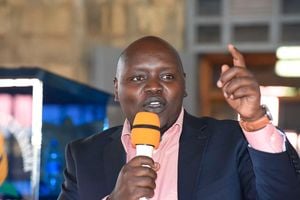Fighting stigma, fighting cancer: The rising threat of male breast cancer in Kenya

Dr Moses Musonga during the interview at his home in Cheptulu, Vihiga County, Hamisi Sub-County on October 7, 2024. His battle with breast cancer began with a small, painless lump on his right breast that gradually grew larger, a problem that took a long time to be identified.
What you need to know:
- Male breast cancer cases are rising in Kenya, yet the disease remains shrouded in stigma and misconception.
- The experiences of a 73-year-old former teacher and a 55-year-old businessman reveal how gender bias in healthcare, delayed diagnosis, and cultural stigma are creating a deadly crisis where men face higher mortality rates than women.
- Data shows male breast cancer cases have increased by 40 per cent globally over the past two decades, with men typically waiting six to ten months before seeking medical help due to shame and lack of awareness.
In the quiet village of Cheptul, Vihiga County, 73-year-old Dr Moses Musonga sits in his home, his weathered hands folded in his lap as he recounts a decade-long battle with a disease that many believe only affects women. His story challenges this misconception and reveals a painful truth: breast cancer knows no gender.
"Before getting a diagnosis, I was in denial," Musonga says, his voice steady as he recalls the beginning of his journey.
"The doctors often dismissed my concerns, giving me antibiotics instead, as they didn't expect a man to have breast cancer. They didn't even take any samples of my breast to determine what the issue was."
It began in 2013 with what seemed insignificant – a small, painless lump in his right breast that gradually grew larger, a problem that took a long time to be identified.
But Musonga had unknowingly been carrying the disease for nearly a decade before that. The father of five remembers being assured for years that he would be fine, with no mention of the possibility of breast cancer.
Hope finally emerged at Vihiga County Referral Hospital (VCRH) in Vihiga County.
"Here, the doctor didn't take time to realise it was breast cancer, but to be sure, he sent me to a facility in Kisumu for my samples to be taken and sent to Nairobi for analysis," he recalls. Two weeks later, the results confirmed stage three breast cancer, and the disease was metastatic, meaning it could spread to other parts of his body, hence required immediate action.
What followed was a gruelling journey through treatment. Musonga underwent the surgery a few days later at the same hospital and his right breast was removed. After surgery, he faced six intense rounds of chemotherapy in Nairobi.
The journey through chemotherapy tested Musonga's endurance to its limits.
"I began my journey with six intense sessions of chemotherapy. The treatment was tough; I often went five days without eating and faced severe side effects like purging, diarrhoea, and fatigue," he recalls, reflecting on the months that followed.
Between treatments, Musonga spent long hours in hospital corridors, waiting for tests that would monitor his response to treatment and assess his immune system function. Though the chemotherapy ended successfully, his doctors strongly advised him to undergo both radiotherapy and a five-year course of hormonal treatment. Instead, he chose to return to work.
"I ignored those subsequent treatments because I felt I was already improving, and the chemotherapy had really taken a toll on my body. Plus, I hadn't fully come to terms with the fact that I was being treated for breast cancer, so I dismissed it," he adds.
This decision would cast a long shadow over his future. While his health initially improved after chemotherapy, the reprieve proved temporary.
In 2018, five years after his first diagnosis, Musonga developed an ominous cough accompanied by severe chest pain. Medical examinations revealed devastating news: he had advanced-stage lung cancer.
"The doctor told me that this was as a result of the breast cancer treatments I had skipped, and there was no need for treatment and instead recommended palliative care. I felt hopeless and there were times that I would have nightmares that I was dead," Musonga reflects, describing the despair that followed.
His health challenges had begun mounting even before this diagnosis. In 2016, he was already managing diabetes, a condition he has now lived with for 15 years. That same year, he faced another significant medical challenge: an enlarged prostate that required surgery.
Losing job
Despite these setbacks, he remained committed to his teaching position at the theological college. "Then, I was still teaching at the theological college and I was afraid of losing my job because already I had been away for too long because of my illness. For this reason, I would teach with a catheter in my bag, and my students knew what was happening," he admits.
When hope seemed lost, Musonga's family refused to accept defeat. They took him back to Nairobi where he underwent another round of chemotherapy, completing it in December 2018. This time, he followed through with the hormonal therapy he had previously skipped.
"The medication was expensive, costing about Sh200 per tablet each day, and I was prescribed to use it for five years, a dose that ended in December 2023," he shares, noting the emotional and financial strain it placed on his family.
The financial burden of cancer treatment weighed heavily on the family. During his first battle with cancer, he cobbled together support from various sources, including fundraising efforts from friends in Kenya and the US, as well as contributions from his children. His employer provided crucial support by maintaining his salary throughout a six-month sick leave.
"At one point, the church organised a fundraising campaign to help with my medical expenses," he adds. Despite this generosity, the costs remained overwhelming.
Read also: I'm the grandfather of breast surgery
"But there was still a lot more to cover in medical expenses and during my breast cancer treatment, the NHIF did not cover breast cancer treatment. We had to find other means," he explains. The situation improved during his second treatment when NHIF covered most expenses.
Throughout his journey, family support proved invaluable. His wife, a nurse by profession, became his strongest advocate and guide through the medical maze.
"She knew what was happening and even during the first diagnosis, she walked with me everywhere and she is the one who broke the news to me and even to the children. My family accepted it, although they were surprised," he recalls. His extended family also rallied around him.
Yet beyond his family's protective circle, Musonga faced the harsh reality of stigma surrounding male breast cancer. "Many in the community were unaware that men could get breast cancer," he notes. Some villagers, noticing his weight loss during treatment, even speculated he might have HIV.
Stigma
This stigma extended into the healthcare system itself, which seemed ill-equipped to handle male breast cancer cases. He found himself increasingly isolated, with few resources tailored for men in his situation.
"There were no support groups for men like me. There was a time when I googled support groups for men with breast cancer and couldn't find any. The only options available were general cancer support groups, and even then, many didn't respond when I reached out," he laments. In the end, his family remained his sole source of emotional support through the ordeal.
The stigma surrounding male breast cancer that Musonga experienced resonates deeply with Bethwel Nyangweso, a 55-year-old businessman and farmer from Nyakongo village in Kisii County. After receiving a stage three breast cancer diagnosis in February 2023, Nyangweso embarked on his own challenging journey with the disease.

Bethwel Nyangweso, a breast cancer survivor at his home in Nyakongo area of Kisii Township. The stigma attached to the disease, often seen as 'woman’s illness' , made it difficult for him to tell his children about his condition.
His treatment began swiftly. In February, he underwent a mastectomy to remove his left breast, followed by eight rounds of chemotherapy from April through July. The absence of radiotherapy facilities in Kisii meant regular travels to Nairobi, where he completed 15 sessions at MP Shah Hospital. Now, like many breast cancer survivors, he faces five years of daily hormonal therapy.
The financial toll on Nyangweso and his family proved substantial. They were forced to liquidate assets – including two cows and 40 chickens – and sell part of the maize harvest intended for his children. Even with multiple fundraising efforts, meeting the treatment costs remained a struggle.
Yet for him, the emotional burden of stigma outweighed even these financial challenges.
"The stigma attached to this disease, which is often seen as woman's illness, made it incredibly difficult for me to tell my children. It took a long time for me to find the right moment, and when I finally did, my children were frightened. I remember one of them struggled academically because of the situation," he adds.
This reluctance to seek help due to stigma concerns medical professionals. According to Solomon Omare, an oncology nurse specialist at the Kenyatta National Hospital (KNH), "This stigma frequently discourages men from seeking medical help and this remains a significant barrier, preventing many men from seeking necessary medical attention."
The statistics paint a sobering picture. Globocan's 2022 data reveals that male breast cancer, while rare, affects thousands globally. Of all breast cancer diagnoses that year, 19,000 cases – approximately one per cent – were in men, compared to 2.26 million cases in women.
In Kenya, the disparity is stark: just 18 male cases against 7,243 female cases. The mortality figures tell an equally concerning story, with about 4,500 men globally losing their lives to the disease, compared to 685,000 women.
Though these numbers might appear small, healthcare experts warn they could herald a larger crisis. Analysis of male breast cancer trends shows a notable increase in diagnosed cases over the past 20 years, suggesting this may be an emerging public health concern requiring urgent attention.
The rising incidence of male breast cancer (MBC) is causing growing concern among healthcare professionals. Data from the Surveillance, Epidemiology, and End Results (Seer) program of the National Cancer Institute reveals a troubling trend: between 1975 and 2015, MBC cases increased by 40 per cent, surpassing the 25 per cent increase seen in women during the same period.
Even more alarming are the mortality rates. A September 2019 study published in Jama Oncology exposes a significant gender disparity in survival rates. Men face a higher risk of death following diagnosis, particularly in the crucial first five years. The numbers are stark: while women show an 86.4 per cent five-year survival rate, men lag behind at 77.6 per cent.
The study points to a critical issue: the systematic under-treatment of men with breast cancer. "This poses a disadvantage for men, given the severity of breast cancer in this demographic," explains Dr Miriam Mutebi, a breast cancer oncologist and assistant professor in the Department of Surgery at Aga Khan University Hospital.

Dr Miriam Mutebi, a breast cancer oncologist and assistant professor in the Department of Surgery at Aga Khan University Hospital.
Solomon Omare, an oncology nurse specialist at Kenyatta National Hospital, attributes this under-treatment partly to the disease's rarity. "The low suspicion index among care providers regarding breast cancer, coupled with the infrequency of male breast cancer, limits their awareness," he explains. This lack of awareness, he notes, often results in delayed diagnoses, significantly impacting survival rates.
The biology of male breast cancer presents additional challenges.
"Breast cancer tends to be more aggressive in men than in women because men have less breast tissue, allowing the cancer to spread more quickly to other parts of the body," explains Dr Mutebi. She notes that this anatomical difference can lead to faster and more aggressive disease progression in men.
While medical factors play a significant role, behavioural patterns also contribute to poor outcomes. The World Health Organisation emphasises early detection through mammography as the gold standard for breast cancer management. However, men's general reluctance to seek preventive care or undergo routine health screenings – unlike women, who regularly engage with healthcare systems for reproductive health – may be inadvertently compromising their fight against this disease.
The challenges facing men with breast cancer in Kenya are multifaceted, encompassing social, economic, and systemic issues, according to Phoebe Ongadi, Executive Director of the Kenyan Network of Cancer Organisations (Kenco).
"Cultural and societal expectations can discourage men from addressing health issues, particularly breast cancer, as breasts are often seen as symbols of femininity, thus view the disease primarily as a female disease, leading them to believe they are at little risk," she explains.
Awareness campaigns
This misconception profoundly affects awareness and screening, according to Omare, the oncology nurse specialist at KNH. He notes that even well-intentioned initiatives can reinforce gender stereotypes.
"Even modern breast cancer awareness campaigns, such as the pink ribbon alliance, perpetuate gendered notions about the disease." This perception, he explains, has negatively impacted men's willingness to seek breast screenings, often leading to late presentations at healthcare facilities when the disease has advanced, resulting in poor prognoses.
The stigma's impact is so significant that some men avoid acknowledging the disease's name. "One patient once mentioned that he tells people he has cancer of the chest instead of calling it breast cancer," adds Omare.
Beyond stigma, experts point to delayed symptom reporting as a critical issue.
"Many men tend to ignore early warning signs and only seek medical help when symptoms escalate to a critical level, often resulting in later-stage diagnoses compared to women," he explains.
Studies reveal that men typically wait six to ten months after noticing symptoms before consulting healthcare professionals, significantly increasing their risk of advanced disease. Moreover, the lack of awareness and education about health risks — often focused more on women — leaves men uninformed about symptoms and the importance of early detection.
The awareness gap is particularly pronounced in Kenya.
"Most cancer awareness campaigns tend to generalise breast cancer without specific focus on male breast cancer," Phoebe notes.
The problem extends to support services as well. "I haven't heard of any and most of the support programs in hospitals and community centres are exclusively geared toward women," Omare points out. This lack of targeted support explains why men like Musonga often face their battles alone.
However, efforts are underway to address these challenges. The Kenyan government's Breast Cancer Action Plan (2021-2025) specifically includes strategies for male breast cancer awareness and improved screening. The plan aims to enhance early detection and outlines approaches for community education to help reduce diagnostic delays often seen in male cases.
Recent data from the Kenya Health Information System (KHIS) reveals evolving trends in male breast cancer (MBC) diagnoses. From January 2023 to August 2024, while only three new cases were reported, there were 77 revisit cases across various hospitals, suggesting that some men are actively seeking services for breast cancer.
Despite these improvements, significant gaps in advocacy and resource allocation persist.
Outreach programs
"It is crucial to promote regular screening, particularly among those with known risk factors, and to ensure that male breast cancer does not become a neglected area within the broader cancer awareness initiatives," Omare emphasises.
Given the rising incidence of breast cancer among men, Phoebe advocates for developing male-friendly services focused on targeted screening, early diagnosis, and treatment.
"We need to adapt our community outreach programs to highlight the role of men in breast cancer screening, diagnosis, and treatment," Omare adds.
"The successful involvement of men in reproductive health initiatives shows that similar strategies can be effective in cancer care as well. It's time to incorporate this approach to help raise awareness."





